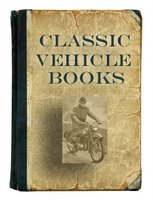Insuring A Classic Vehicle
Insuring a classic vehicle is very different to insuring your usual family vehicle and to ensure you get the most appropriate deal for your needs, you need to understand how the system works.
A few things you need to consider when insuring a classic vehicle:
- Will you be able to find someone qualified to work on any accident damage etc or will you need to do it yourself? If you do want to do the work yourself, what cost should you put on your time and effort?
- Values can sometimes increase dramatically over a 12 month period. So its better to over insure than to under insure.
- If you're planning to exhibit your classic car or motorcycle at shows etc, you might need to look into third party injury and/or liability cover. Also check that the vehicle will be covered for damage whist on display.
- Will the vehicle be covered during restoration and/or storage periods?
- Mileage cover. Many insurance companies offer reduced premiums for limited mileage cover. If you take this option, make sure you can remain within the mileage restrictions. If you exceed the restriction, not only will you not have cover in event of an accident or loss, youll be in serious breach of the law.
- Remember if you're shipping your classic vehicle from A to B, your ordinary insurance policy may well be invalid for that time period, so make sure the vehicle has alternative cover.
- Check the policy carefully to ensure you're covered at all times. Some policies have very strange requirements in the small print. Some expect you to own another daily use vehicle, some have age and/or area restrictions, some forbid certain uses such as show or commerce etc etc.
When insuring a classic vehicle, don't just call your local insurance broker. Instead go online to look for what you need because it's there you'll find the biggest selection of specialist companies, the best policies and the best prices.
When consulting with your insurance broker it's a good idea to ask about his or her experience of insuring classic cars or motorcycles and if its a new field for them, you might like to consider consulting a specialist broker.
Whoever you choose, try to ask theoretical questions and try even harder to get those replies in writing. Remember that a verbal statement wont hold much water in any claims dispute.
Make a point of asking the broker to confirm their own particular interpretation of terms such as 'actual cash value' (ACV), stated value, (SV) and agreed value (AV) etc. Also make a point of asking them to confirm quite who does the valuation.
In closing, my advice would be not to necessarily go for the cheapest option. You get what you pay for and you certainly don't ever get what you dont pay for. Remember your classic vehicle is probably virtually irreplaceable, so why skimp on a few dollars or pounds when it can cost you a loss of thousands.
Classic Motorcycle Books
- General Classic Motorcycle Books
- Classic American Bike Books
- Classic Australian Bike Books
- Classic Austrian Bike Books
- Classic British Bike Books
- Classic Czech Bike Books
- Classic German Bike Books
- Classic Italian Bike Books
- Classic New Zealand Bike Books
- Classic Spanish Bike Books
- General Interest Motorcycle Books





